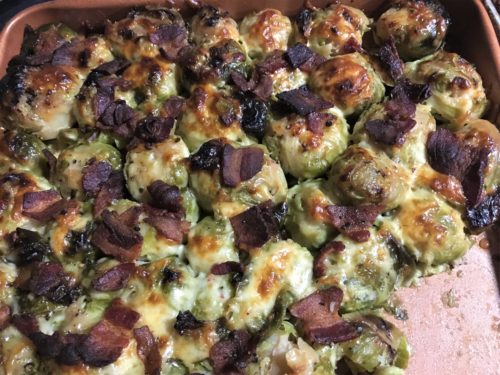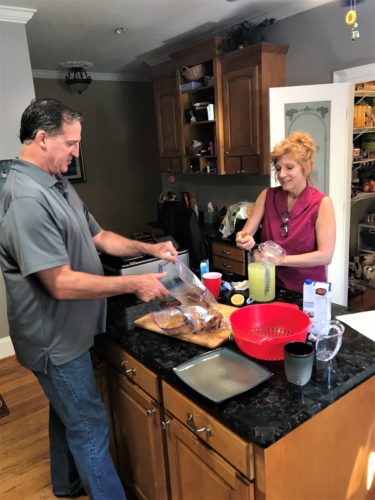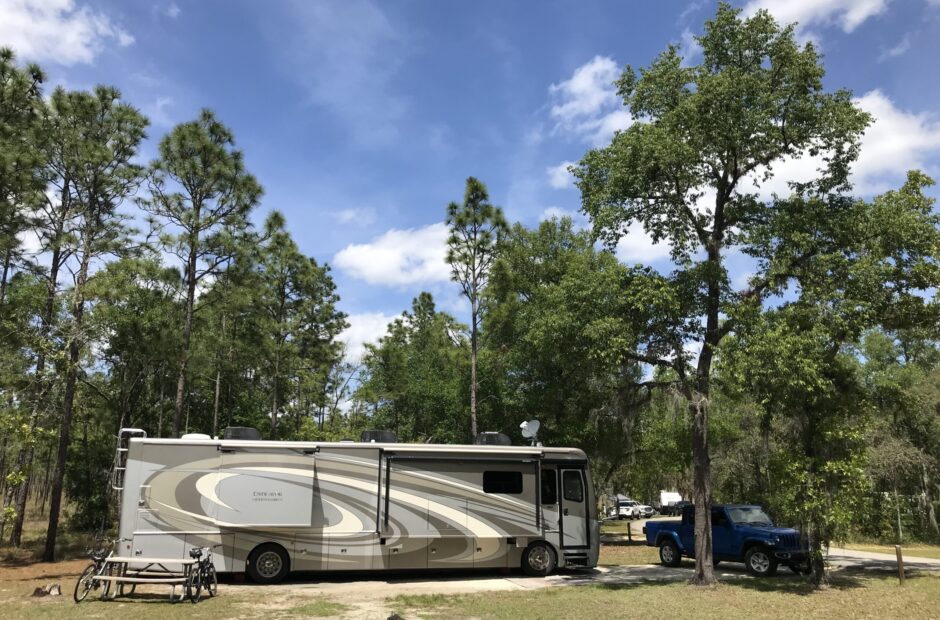Croft State Park, Spartanburg, South Carolina
Shout for joy to the Lord, all the earth. Worship the Lord with gladness; come before him with joyful songs. Know that the Lord is God. It is he who made us, and we are his; we are his people, the sheep of his pasture. Enter his gates with thanksgiving and his courts with praise; give thanks to him and praise his name. For the Lord is good and his love endures forever; his faithfulness continues through all generations. ~ Psalm 100
We were able to spend Thanksgiving with Blaine’s brother Bruce and his family, which included his wife, Donna, two of their three children – Rachel and Gage (and his girlfriend, Morgan), Donna’s parents, and one of Gage’s friends, Garrison.
As with last year, we had a bountiful feast! Two turkeys, smashed potatoes and gravy, stuffing, roasted sweet potatoes, brussels sprouts, macaroni and cheese, veggies and dip, cranberry sauce, pineapple pie and death by chocolate. Ugh!! Stuffed like those turkeys!
Here’s a couple of pictures and my Death By Chocolate recipe:

This picture came in a text with a caption,
“That’s not turkey!” Hahaha!!

That’s better, Miss Harper!

This is Leo. He’s a Maine Coon. He’s beautiful and huge!
And he’s only 7 months old!


Would you look at the size of that cat!?!?!?
And even with all that fur, he doesn’t shed!

We played several rounds of corn hole, and keep away. : )
That’s Kiya, Gage & Morgan’s dog. She’s about 6 months old.

Brussels Sprouts with pepper jack and bacon, and I’m not sure what else.

Roasted sweet potatos with a Parmesan/breadcrumb sprinkle

I was assigned KP duty


Gage, Rachel, Bruce, Blaine, Donna and me
DEATH BY CHOCOLATE
1 package favorite brownie mix (Betty Crocker), plus ingredients to bake them
2 packages instant chocolate pudding (or chocolate mousse mix)
6 Heath bars, crushed
1 large Cool Whip
Prepare brownies according to package. Cool completely. Prepare pudding according to package. Tear up brownies as you go. Layer dessert three times starting with brownies and ending with Cool Whip.
We had such a wonderful time talking about all kinds of things – past and present! Secrets were revealed, history exposed, you know . . . . normal family stuff. 😊
Even though we had a wonderful time, I still really missed our big family gathering in Ohio.
I was curious about the origin of the holiday and found this on the web:
Thanksgiving Day, annual national holiday in the United States and Canada celebrating the harvest and other blessings of the past year. Americans generally believe that their Thanksgiving is modeled on a 1621 harvest feast shared by the English colonists (Pilgrims) of Plymouth and the Wampanoag people. The American holiday is particularly rich in legend and symbolism, and the traditional fare of the Thanksgiving meal typically includes turkey, bread stuffing, potatoes, cranberries, and pumpkin pie. With respect to vehicular travel, the holiday is often the busiest of the year, as family members gather with one another.
Plymouth’s Thanksgiving began with a few colonists going out “fowling,” possibly for turkeys but more probably for the easier prey of geese and ducks, since they “in one day killed as much as…served the company almost a week.” Next, 90 or so Wampanoag made a surprise appearance at the settlement’s gate, doubtlessly unnerving the 50 or so colonists. Nevertheless, over the next few days the two groups socialized without incident. The Wampanoag contributed venison to the feast, which included the fowl and probably fish, eels, shellfish, stews, vegetables, and beer. Since Plymouth had few buildings and manufactured goods, most people ate outside while sitting on the ground or on barrels with plates on their laps. The men fired guns, ran races, and drank liquor, struggling to speak in broken English and Wampanoag. This was a rather disorderly affair, but it sealed a treaty between the two groups that lasted until King Philip’s War (1675–76), in which hundreds of colonists and thousands of Native Americans lost their lives.
The New England colonists were accustomed to regularly celebrating “Thanksgivings,” days of prayer thanking God for blessings such as military victory or the end of a drought. The U.S. Continental Congress proclaimed a national Thanksgiving upon the enactment of the Constitution, for example. Yet, after 1798, the new U.S. Congress left Thanksgiving declarations to the states; some objected to the national government’s involvement in a religious observance, Southerners were slow to adopt a New England custom, and others took offense over the day’s being used to hold partisan speeches and parades. A national Thanksgiving Day seemed more like a lightning rod for controversy than a unifying force.
Thanksgiving Day did not become an official holiday until Northerners dominated the federal government. While sectional tensions prevailed in the mid-19th century, the editor of the popular magazine Godey’s Lady’s Book, Sarah Josepha Hale, campaigned for a national Thanksgiving Day to promote unity.
Some people have credited Charles Dickens’s A Christmas Carol (1843) with bolstering the idea of turkey as a holiday meal. But another writer, Sarah Josepha Hale, played an arguably more important role. In her 1827 novel Northwood, she devoted an entire chapter to a description of a New England Thanksgiving, with a roasted turkey “placed at the head of the table.” At about the same time, she also began campaigning to establish Thanksgiving as a national holiday in the United States, which she believed would help unify the country as it teetered toward civil war. She finally won the support of President Abraham Lincoln. On October 3, 1863, during the Civil War, Lincoln proclaimed a national day of thanksgiving to be celebrated on Thursday, November 26. (The Civil War didn’t end until May 9, 1865)
As Thanksgiving became an official American holiday, a national mythology formed around it. An 1841 collection of Pilgrim writing had referred to the meal described by Winslow as “the first Thanksgiving.” Although Winslow didn’t specifically mention turkey, his fellow colonist William Bradford did refer to a “great store of wild Turkies” at Plymouth that fall, in a journal that was reprinted in 1856. Before long, the cultural links between Pilgrims, turkeys, and Thanksgiving became an inextricable and integral part of American schoolchildren’s education.
The holiday was annually proclaimed by every president thereafter, and the date chosen, with few exceptions, was the last Thursday in November. President Franklin D. Roosevelt, however, attempted to extend the Christmas shopping season, which generally begins with the Thanksgiving holiday, and to boost the economy by moving the date back a week, to the third week in November. But not all states complied, and, after a joint resolution of Congress in 1941, Roosevelt issued a proclamation in 1942 designating the fourth Thursday in November (which is not always the last Thursday) as Thanksgiving Day.
As the country became more urban and family members began to live farther apart, Thanksgiving became a time to gather together. The holiday moved away from its religious roots to allow immigrants of every background to participate in a common tradition. Thanksgiving Day football games, beginning with Yale versus Princeton in 1876, enabled fans to add some rowdiness to the holiday. In the late 1800s parades of costumed revelers became common. In 1920 Gimbel’s department store in Philadelphia staged a parade of about 50 people with Santa Claus at the rear of the procession. Since 1924 the annual Macy’s parade in New York City has continued the tradition, with huge balloons since 1927. The holiday associated with Pilgrims and Native Americans has come to symbolize intercultural peace, America’s opportunity for newcomers, and the sanctity of home and family.
~ copied from two articles I found on Encyclopedia Britannica
Here’s a copy of President Abraham Lincoln’s proclamation, written by Secretary of State, William Seward (Seward was a surviving victim of the assassination plot, suffering multiple knife wounds and taking about six weeks to recover. He also acquired Alaska while he served as Secretary – among other notable achievements.)
This is the proclamation which set the precedent for America’s national day of Thanksgiving. During his administration, President Lincoln issued many orders similar to this. For example, on November 28, 1861, he ordered government departments closed for a local day of thanksgiving.
Sarah Josepha Hale, a 74-year-old magazine editor, wrote a letter to Lincoln on September 28, 1863, urging him to have the “day of our annual Thanksgiving made a National and fixed Union Festival.” She explained, “You may have observed that, for some years past, there has been an increasing interest felt in our land to have the Thanksgiving held on the same day, in all the States; it now needs National recognition and authoritive fixation, only, to become permanently, an American custom and institution.”
Prior to this, each state scheduled its own Thanksgiving holiday at different times, mainly in New England and other Northern states. President Lincoln responded to Mrs. Hale’s request immediately, unlike several of his predecessors, who ignored her petitions altogether. In her letter to Lincoln she mentioned that she had been advocating a national thanksgiving date for 15 years as the editor of Godey’s Lady’s Book. George Washington was the first president to proclaim a day of thanksgiving, issuing his request on October 3, 1789, exactly 74 years before Lincoln’s.
The document below sets apart the last Thursday of November “as a day of Thanksgiving and Praise.” According to an April 1, 1864, letter from John Nicolay, one of President Lincoln’s secretaries, this document was written by Secretary of State William Seward, and the original was in his handwriting. On October 3, 1863, fellow Cabinet member Gideon Welles recorded in his diary how he complimented Seward on his work. A year later the manuscript was sold to benefit Union troops.
Washington, D.C.
October 3, 1863
By the President of the United States of America.
A Proclamation.
The year that is drawing towards its close, has been filled with the blessings of fruitful fields and healthful skies. To these bounties, which are so constantly enjoyed that we are prone to forget the source from which they come, others have been added, which are of so extraordinary a nature, that they cannot fail to penetrate and soften even the heart which is habitually insensible to the ever watchful providence of Almighty God. In the midst of a civil war of unequalled magnitude and severity, which has sometimes seemed to foreign States to invite and to provoke their aggression, peace has been preserved with all nations, order has been maintained, the laws have been respected and obeyed, and harmony has prevailed everywhere except in the theatre of military conflict; while that theatre has been greatly contracted by the advancing armies and navies of the Union. Needful diversions of wealth and of strength from the fields of peaceful industry to the national defence, have not arrested the plough, the shuttle or the ship; the axe has enlarged the borders of our settlements, and the mines, as well of iron and coal as of the precious metals, have yielded even more abundantly than heretofore. Population has steadily increased, notwithstanding the waste that has been made in the camp, the siege and the battle-field; and the country, rejoicing in the consciousness of augmented strength and vigor, is permitted to expect continuance of years with large increase of freedom. No human counsel hath devised nor hath any mortal hand worked out these great things. They are the gracious gifts of the Most High God, who, while dealing with us in anger for our sins, hath nevertheless remembered mercy. It has seemed to me fit and proper that they should be solemnly, reverently and gratefully acknowledged as with one heart and one voice by the whole American People. I do therefore invite my fellow citizens in every part of the United States, and also those who are at sea and those who are sojourning in foreign lands, to set apart and observe the last Thursday of November next, as a day of Thanksgiving and Praise to our beneficent Father who dwelleth in the Heavens. And I recommend to them that while offering up the ascriptions justly due to Him for such singular deliverances and blessings, they do also, with humble penitence for our national perverseness and disobedience, commend to His tender care all those who have become widows, orphans, mourners or sufferers in the lamentable civil strife in which we are unavoidably engaged, and fervently implore the interposition of the Almighty Hand to heal the wounds of the nation and to restore it as soon as may be consistent with the Divine purposes to the full enjoyment of peace, harmony, tranquillity and Union.
In testimony whereof, I have hereunto set my hand and caused the Seal of the United States to be affixed.
Done at the City of Washington, this Third day of October, in the year of our Lord one thousand eight hundred and sixty-three, and of the Independence of the United States the Eighty-eighth.
By the President: Abraham Lincoln
William H. Seward,
Secretary of State
~ Abrahamlincolnonline.org
THANKSGIVING DAY, 2016
BY THE PRESIDENT OF THE UNITED STATES OF AMERICA
A PROCLAMATIONNearly 400 years ago, a small band of Pilgrims fled persecution and violence and came to this land as refugees in search of opportunity and the freedom to practice their faith. Though the journey was rough and their first winter harsh, the friendly embrace of an indigenous people, the Wampanoag — who offered gracious lessons in agriculture and crop production — led to their successful first harvest. The Pilgrims were grateful they could rely on the generosity of the Wampanoag people, without whom they would not have survived their first year in the new land, and together they celebrated this bounty with a festival that lasted for days and prompted the tradition of an annual day of giving thanks.
This history teaches us that the American instinct has never been to seek isolation in opposite corners; it is to find strength in our common creed and forge unity from our great diversity. On that very first thanksgiving celebration, these same ideals brought together people of different backgrounds and beliefs, and every year since, with enduring confidence in the power of faith, love, gratitude, and optimism, this force of unity has sustained us as a people. It has guided us through times of great challenge and change and allowed us to see ourselves in those who come to our shores in search of a safer, better future for themselves and their families.
On this holiday, we count our blessings and renew our commitment to giving back. We give thanks for our troops and our veterans — and their families — who give of themselves to protect the values we cherish; for the first responders, teachers, and engaged Americans who serve their communities; and for the chance to live in a country founded on the belief that all of us are created equal. But on this day of gratitude, we are also reminded that securing these freedoms and opportunities for all our people is an unfinished task. We must reflect on all we have been afforded while continuing the work of ensuring no one is left out or left behind because of who they are or where they come from.
For generations, our Nation’s progress has been carried forward by those who act on the obligations we have to one another. Each year on Thanksgiving, the selflessness and decency of the American people surface in food banks and shelters across our country, in time spent caring for the sick and the stranger, and in efforts to empathize with those with whom we disagree and to recognize that every individual is worthy of compassion and care. As we gather in the company of our friends, families, and communities — just as the Pilgrims and the Wampanoag did centuries ago — let us strive to lift up others, promote tolerance and inclusiveness, and give thanks for the joy and love that surround all of us.
NOW, THEREFORE, I, BARACK OBAMA, President of the United States of America, by virtue of the authority vested in me by the Constitution and the laws of the United States, do hereby proclaim November 24, 2016, as a National Day of Thanksgiving. I encourage the people of the United States to join together — whether in our homes, places of worship, community centers, or any place of fellowship for friends and neighbors — and give thanks for all we have received in the past year, express appreciation to those whose lives enrich our own, and share our bounty with others.
IN WITNESS WHEREOF, I have hereunto set my hand this
twenty-third day of November, in the year of our Lord two thousand sixteen, and of the Independence of the United States of America the two hundred and forty-first.BARACK OBAMA
Interesting read. No mention of God whatsoever . . . . .
Many try to ignore and even eliminate rightful recognition of God’s providence, mercy and grace from our country and beliefs, but they will never succeed.
Presidential Proclamation on Thanksgiving Day, 2018
Issued on: November 20, 2018
On Thanksgiving Day, we recall the courageous and inspiring journey of the Pilgrims who, nearly four centuries ago, ventured across the vast ocean to flee religious persecution and establish a home in the New World. They faced illness, harsh conditions, and uncertainty, as they trusted in God for a brighter future. The more than 100 Pilgrims who arrived at Plymouth, Massachusetts, on the Mayflower, instilled in our Nation a strong faith in God that continues to be a beacon of hope to all Americans. Thanksgiving Day is a time to pause and to reflect, with family and friends, on our heritage and the sacrifices of our forebearers who secured the blessings of liberty for an independent, free, and united country.
After surviving a frigid winter and achieving their first successful harvest in 1621, the Pilgrims set aside 3 days to feast and give thanks for God’s abundant mercy and blessings. Members of the Wampanoag tribe who had taught the Pilgrims how to farm in New England and helped them adjust and thrive in that new land shared in the bounty and celebration. In recognition of that historic event, President George Washington, in 1789, issued a proclamation declaring the first national day of thanksgiving. He called upon the people of the United States to unite in rendering unto God our sincere and humble gratitude “for his kind care and protection of the People of this Country” and “the favorable interpositions of his Providence.” President Abraham Lincoln revived this tradition as our fractured Nation endured the horrors of the Civil War. Ever since, we have set aside this day to give special thanks to God for the many blessings, gifts, and love he has bestowed on us and our country.
This Thanksgiving, as we gather in places of worship and around tables surrounded by loved ones, in humble gratitude for the bountiful gifts we have received, let us keep in close memory our fellow Americans who have faced hardship and tragedy this year. In the spirit of generosity and compassion, let us joyfully reach out in word and deed, and share our time and resources throughout our communities. Let us also find ways to give to the less fortunate whether it be in the form of sharing a hearty meal, extending a helping hand, or providing words of encouragement.
We are especially reminded on Thanksgiving of how the virtue of gratitude enables us to recognize, even in adverse situations, the love of God in every person, every creature, and throughout nature. Let us be mindful of the reasons we are grateful for our lives, for those around us, and for our communities. We also commit to treating all with charity and mutual respect, spreading the spirit of Thanksgiving throughout our country and across the world.
Today, we particularly acknowledge the sacrifices of our service members, law enforcement personnel, and first responders who selflessly serve and protect our Nation. This Thanksgiving, more than 200,000 brave American patriots will spend the holiday overseas, away from their loved ones. Because of the men and women in uniform who volunteer to defend our liberty, we are able to enjoy the splendor of the American life. We pray for their safety, and for the families who await their return.
NOW, THEREFORE, I, DONALD J. TRUMP, President of the United States of America, by virtue of the authority vested in me by the Constitution and the laws of the United States, do hereby proclaim Thursday, November 22, 2018, as a National Day of Thanksgiving. I encourage all Americans to gather, in homes and places of worship, to offer a prayer of thanks to God for our many blessings.
IN WITNESS WHEREOF, I have hereunto set my hand this twentieth day of November, in the year of our Lord two thousand eighteen, and of the Independence of the United States of America the two hundred and forty-third.
DONALD J. TRUMP
I pray that you take time, especially today, to be thankful to our Lord for the bountiful blessings He bestows upon you each and every day.
